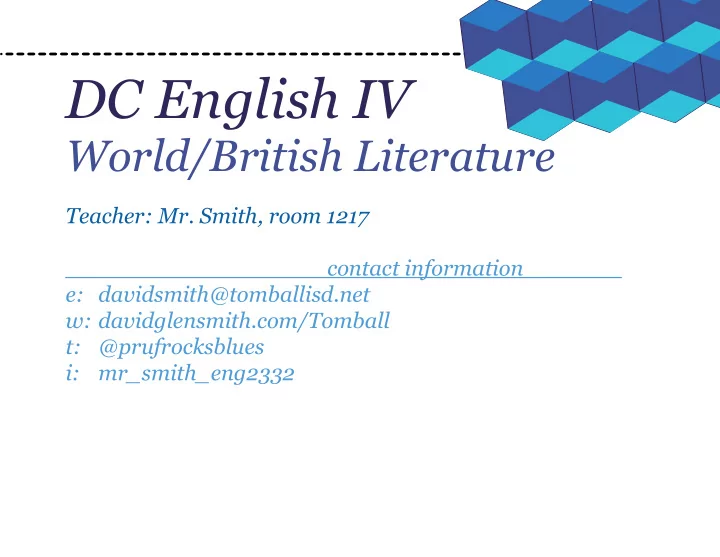

DC English IV World/British Literature Teacher: Mr. Smith, room 1217 contact information e: davidsmith@tomballisd.net w: davidglensmith.com/Tomball t: @prufrocksblues i: mr_smith_eng2332
Aristotle (c. 384-322 BCE) Aristotle was born with connections to the elite class which was set within the Ancient Macedonian court Studied under Plato for a large number of years • Aristotle’s theories branch off the ideals of Plato • like Socrates, both Aristotle and Plato are major infl uences on Western philosophy He would later mentor Alexander the Great of Macedonia Created his own school, the Lyceum, in Athens Consider: How do these notions apply to modern literature? —critical analysis? 2 08.02.19 || English 2332/2333 || D. Glen Smith, instructor Tomball High School
Aristotle’s Ethics One of the many achievements of Aristotle is his development of the three Appeals of Argument Logos ( logical, scientifi c evidence ) Pathos ( emotional, personal evidence ) Ethos ( ethical, authoritative evidence ) 3 08.02.19 || English 2332/2333 || D. Glen Smith, instructor Tomball High School
Ethics / Ethos The philosophy behind Ethos is complex. Ethos explores: • proper attitude and conduct towards one’s audience • explains how to develop a sense of authority in a discussion • provides a road map which details how humans should behave Most importantly, through his concept of ethos, Aristotle’s theories juxtapose against the methods used in the theoretical sciences. • ethical theory: examine morality and consequences of right or wrong action • theoretical sciences: aims to improve theories from natural sciences In this branch of philosophy, generalizations are the common structures for argument. • generalization: a concept obtained by inference 4 08.02.19 || English 2332/2333 || D. Glen Smith, instructor Tomball High School
Ethos / Ethics Students can earn either a Bachelor’s Degree in Ethics or gain supplemental education with a certifi cate in ethics • law • business • medicine • other fi elds that address ethical issues As far as Literary Criticism is concerned, examining ethics allows beginning writers to fi nd their own opinions and impressions to help infl uence their skills with writing and research, plus strengthening their personal style and voice. 5 08.02.19 || English 2332/2333 || D. Glen Smith, instructor Tomball High School
Virtue All three of the major Greek philosophers (Socrates, Plato, Aristotle) follow a common thread of ethics— • virtues are important for developing a sense of well-being • ethical virtues are complex, vital social skills Aristotle specifi cally believed practical wisdom is not gained through simple memorization of set rules. • through practice and personal usage of virtues , an individual can gain a stronger sense of ethical knowledge 6 08.02.19 || English 2332/2333 || D. Glen Smith, instructor Tomball High School
Virtue Theory Virtues —states of character conducive to happiness Although Socrates stresses that knowledge is the only true virtue , Aristotle expands upon this idea, stating there are two groups of virtues : Moral Virtues (emotional satisfaction) = mean (balance) Intellectual Virtues (mental enlightenment) = truth • both classifi cations contain numerous diverse principles • both classifi cations pertain to positive human characteristics • within Aristotle’s publication Nicomachean Ethics he establishes the notion of The Golden Mean as a notion of balance every individual should obtain from the Moral Virtues. 7 08.02.19 || English 2332/2333 || D. Glen Smith, instructor Tomball High School
The Golden Mean “If it is thus, then, that every art does its work well — by looking to the interme- diate and judging its works by this standard (so that we often say of good works of art that it is not possible either to take away or to add anything, implying that excess and defect destroy the goodness of works of art, while the mean preserves it; and good artists, as we say, look to this in their work), and if, further, virtue is more exact and better than any art, as nature also is, then virtue must have the quality of aiming at the intermediate. I mean moral virtue; for it is this that is concerned with passions and actions, and in these there is excess, defect, and the intermediate. For instance, both fear and confi dence and appetite and anger and pity and in general pleasure and pain may be felt both too much and too little, and in both cases not well; but to feel them at the right times, with reference to the right objects, towards the right people, with the right motive, and in the right way, is what is both intermediate and best, and this is characteristic of virtue . Similarly with regard to actions also there is excess, defect, and the intermediate. Now virtue is concerned with passions and actions, in which excess is a form of failure, and so is defect, while the intermediate is praised and is a form of success; and being praised and being successful are both characteristics of virtue. Therefore virtue is a kind of mean, since, as we have seen, it aims at what is intermediate” (2.6). See Google Classroom, “Codes of Law and/or Morality” for further breakdown of the Golden Mean. Aristotle, Nicomachean Ethics , trans. W.D. Ross. July 15, 2015, https://ebooks.adelaide.edu.au/a/aristotle/nicomachean/complete.html. Accessed August 2019. 8 08.02.19 || English 2332/2333 || D. Glen Smith, instructor Tomball High School
Intellectual Virtues Aristotle further declared there are Five Intellectual Virtues (Wisdoms) . “Let us begin, then, from the beginning, and discuss these states once more. Let it be assumed that the states by virtue of which the soul possesses truth by way of affi rmation or denial are fi ve in number, i.e. art, scientifi c knowledge, practical wisdom, philosophic wisdom, intuitive reason ; we do not include judgement and opinion because in these we may be mistaken” (6.3). Aristotle, Nicomachean Ethics , trans. W.D. Ross. July 15, 2015, https://ebooks.adelaide.edu.au/a/aristotle/nicomachean/complete.html. Accessed August 2019. philosophy = philo + sophia (fondness/love for wisdom) Be sure to visit: https://www.youtube.com/watch?v=PrvtOWEXDIQ 9 08.02.19 || English 2332/2333 || D. Glen Smith, instructor Tomball High School
Recommend
More recommend